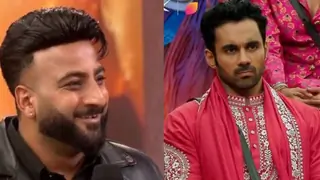This brainless wannabe shd have looked up the meaning of the word Feminism before going on her stupid rants.
Im sure her brainless rants will delight the male nazis or MCPs on the net who love that term feminazi
She shd read up some real life cases of abuse on women and female child before opening her mouth next time abt something she has no idea abt in her sheltered, entitled life.
http://morningstaronline.co.uk/a-23f4-The-girls-and-women-killed-by-their-own-families#.WMFtcHOnzqC
EVERY rural region of India has its own, age-old method. In the west, it is doodh-peeti (swimming in milk); in the east, "salt in the mouth."
"Swimming" is the euphemism for forcible drowning in a pail of milk. "Salt in the mouth" is essentially suffocation with salt, which is poured into the mouth: the lips are then held closed.
These are two of several traditional ways of killing unwanted female babies, in a country where the mortality rate for girls is 75 per cent higher than for boys.
In 2008, a little girl who would much later be named Karishma ("miracle") was born into a wealthy family in Bengal.
She was a healthy, beautiful baby, but neither loved nor wanted by her father's family. On hearing her sex, her grandmother warned: "I will put salt in her mouth." As soon as she was able, she would keep her word.
For the first four months of her life, Karishma lived with her mother Roopa at the home of Roopa's parents, who welcomed their granddaughter.
Roopa was then obliged to return to her husband and her in-laws' home.
She knew the move would put her daughter's life, and her own, in jeopardy, but believed this to be her lot as a wife.
Soon after the move back, Roopa interrupted her mother-in-law attempting to kill Karishma, as she had promised, with salt.
The young mother managed to save her daughter, and thereafter carried her swaddled to her back for as much of the day as she could, even taking her to the toilet with her.
Although alive, Karishma was ignored and neglected, with her paternal relatives behaving as if she didn't exist.
She spent her babyhood lying silently on the floor by her mother as Roopa carried out her gruelling schedule of chores, cooking and cleaning for her in-laws and husband.
The family refused to provide money for food, milk or medicine for Karishma, and Roopa had none of her own.
Roopa's eldest child, a son, was contrastingly doted on. The little boy was fond of his new sister, too; but as he got older, his grandmother began telling him the family would love him even more if he killed Karishma. She would motion with her hands to show him how he could strangle his little sister.
When Karishma was one, her grandfather began to beat her so severely she would pass out with pain. Her body was constantly covered in bruises. Roopa was violently abused by her father-in-law, too, culminating in an attempt to kill her by forcing her to drink acid.
Roopa came very close to death on that occasion. As soon as she was able, she fled to her parents' home with Karishma.
Mother and daughter's lives were transformed. Karishma's grandmother, Sandya, painstakingly peeled and mashed fresh vegetables to prepare the most nutritious and palatable food for her granddaughter, who had been so severely malnourished doctors declared her weeks from death.
For the first time, Karishma played with other children, at a small local nursery school. Against all odds, the resilient little girl began to blossom, and to show a happy disposition.
Even at two years old she still had no official name, having never been given one.
That would change only when she came to the attention of one of India's most determined campaigners.
In 2006, Rita Banerji, author and gender activist, had begun the unique 50 Million Missing campaign. 50 million is the estimated number of females, from foetuses to adults, eliminated from the Indian population in the course of the last three generations.
The death toll includes those killed by foeticide, infanticide, murders where "honour" is the excuse, and "dowry" murders.
It is common for a husband and/or his family to demand ever-increasing dowry payments from the wife's parents, effectively holding her hostage: if sufficient amounts are not forthcoming, she might be killed.
Since wives spend a great deal of time in the kitchen, cooking "accidents" are often staged to dispose of them " they will be doused with kerosene and set alight. Around 106,000 women are burned to death in India each year.
Because of the ideological climate in India, Banerji knew any campaign of this type would be hugely controversial.
She decided to establish 50 Million Missing as a "zero-fund" organisation, with no resources of its own and no fundraising activities, so that she could not be accused of profiting from it. Even so, she has frequently been accused of lying and fabrication in order to make money.
It was Banerji who heard about Roopa's plight, and who finally named Karishma.
50 Million Missing offered Roopa counselling, and help to build a new life; they explained that they could assist her in finding a safe house for herself and her daughter, and employment.
But quite suddenly, in May 2010, Roopa took the decision to return with Karishma to the marital home. She was clear that she knew her daughter's life would once again be in grave danger, but felt that she was in a hopeless situation: if she left Karishma behind with her own parents, she would face further abuse from her in-laws. Banerji pleaded with her, but to no avail, and Roopa returned.
A group of lawyers alerted by 50 Million Missing went to the house, pleading with Roopa to allow them to take her and Karishma to a place of safety. Roopa refused, saying she could and would not leave without the permission of her husband.
The campaign had no ability to take further action: there is no law in India allowing state or legal intervention when a child's life or safety is endangered in her parents' home. Unless both her parents chose to give Karishma up, she could not be fostered or adopted. The fear was that, should Karishma survive to five or six, she would be sold by her grandparents into the sex trade, a common fate of unwanted girls, which saves families from having to provide them with a dowry.
As distressing as this was for all involved in the case, Banerji stresses that Roopa's choice was by no means an unusual one: she calls it a "culturally conditioned" response.
The belief that a woman's rightful place is with her husband, regardless of his behaviour, is, she says, allpowerful in India. Divorce is still considered a source of shame, especially for women.
"One hardly ever hears an Indian woman openly speak out about how she survived a violent marriage," Banerji says.
All that remained was to remain in touch with Sandya, Karishma's maternal grandmother, and hope for good news of the little "miracle" girl.









































1